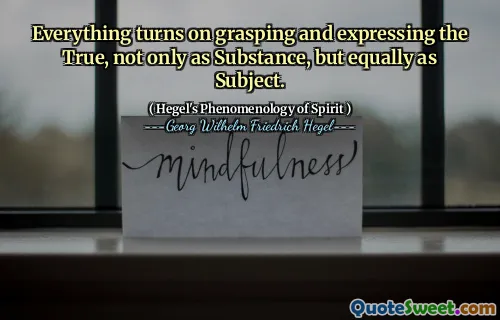
Everything turns on grasping and expressing the True, not only as Substance, but equally as Subject.
This quote from Georg Wilhelm Friedrich Hegel's Phenomenology of Spirit encapsulates a critical aspect of his philosophical approach: the inseparability of being (Substance) and consciousness or self-awareness (Subject) in the realization of Truth. Hegel emphasizes that understanding the True is not limited to viewing it as an objective essence or mere substance independent of the observer. Instead, Truth must be apprehended as something that equally entails the subjective dimension—the active, dynamic process of perception, interpretation, and expression that animates reality for the conscious mind.
This interplay suggests that Truth is not a static entity residing 'out there,' detached from our cognitive faculties. It is a living synthesis, an active relationship between the knower and the known. Substance without subjectivity remains inert and potentially unintelligible; subjectivity without substance is fragmented and potentially illusory. Therefore, a full grasp of Truth integrates both aspects: the external reality and the internal, conscious engagement with it.
Moreover, this integrated view challenges the traditional epistemological dichotomy that often separates objectivity and subjectivity. For Hegel, knowledge and reality co-evolve, reinforcing each other through a dialectical process. One implication is that personal or collective self-consciousness profoundly shapes the manifestation and expression of Truth. It elevates philosophical inquiry beyond mere description of phenomena toward a deeper understanding of reality as a process of becoming, where the mind and the world are intertwined.
In practical terms, this philosophy encourages us to reflect on how our perspectives contribute to the truths we affirm and communicate. Ultimately, Hegel invites us to recognize that Truth is a dynamic, holistic relationship rather than a fixed, solitary fact.






